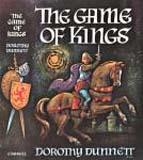Francis Lymond
Been There, Dunnett
 When I came upon The Game of Kings I was instantly smitten and went to bed with the book for three days. Went to bed with the book? It was as if I’d been to bed with Francis Lymond himself. The word ‘ravished’ comes to mind – and that’s not bad for a 54-year-old teacher who looks like a dumpling.
When I came upon The Game of Kings I was instantly smitten and went to bed with the book for three days. Went to bed with the book? It was as if I’d been to bed with Francis Lymond himself. The word ‘ravished’ comes to mind – and that’s not bad for a 54-year-old teacher who looks like a dumpling.
For the next eight months I lived the story of Francis Lymond. He even became part of my teaching. I told my first years all about Lymond sneaking back into Edinburgh. I told them about how authors let us see people through the eyes of other characters and – wasn’t Dorothy Dunnett clever? – we discover what Tom Erskine and Sir Walter Scott of Buccleuch and the rest of the Scottish nobility are thinking about Francis Lymond, and we haven’t met him yet.
The children loved it. They were enchanted by the tale of Mungo Tennant’s drunken sow and delighted by the trick played on the good folk of Edinburgh of flooding the wells with claret. So I added a few more characters! Who’s to know a maidservant called Betty was sent out by her mistress to fetch water and didn’t come back for a week – and that the sow escaped and ran amok in the High Street! The heads went down on the desks and they listened to my version of this wonderful beginning – and this was last period on a Friday when everybody is straining at the leash to escape.
And so it went on. I bribed my wild boys in second year to stop blethering and do some work with promised tales of Lymond in France. They were swept along with the swash and buckle of it all, the back-stabbing and the plotting and the voluptuous richness of the French court and the powerful people who inhabited it. I dread to think what part of the national curriculum I failed to teach them.
Some of the stories I kept to myself because they were too new and too much a part of me. I loved Philippa from the start and gradually began to talk about her. I remember sitting in the school library one sunny day describing her to a group of sixth year girls. They admired the headstrong, independent streak which prompted her to chase round the Mediterranean in search of Lymond’s son, alone.
What did they make of Philippa’s life in the harem? They shrieked with mirth when she was assaulted by the indignities of grooming lessons and rebelled against them. But wasn’t it wonderful that all the attention to ladylike pursuits produced amazing results and Philippa became a beauty? We struggled with what she really was doing, practising crawling up the bed from the foot, but we got the picture. Then she was rescued and we felt such sadness on her wedding day. What should have been joyful was reduced to a few rushed words in a bare room, merely an empty ceremony to salvage Philippa’s tarnished reputation.
 With another class I rashly advised some loud fifth year boys that if they wanted to be gentlemen, they would have to learn the meaning of chivalry. They fell off their chairs laughing, the most response they’d made to anything I’d said in weeks. So I told them the story of the chess game, the brutality and ruthlessness of it. Then I threw all caution to the wind and told them about Lymond’s return from Calais in Checkmate and Philippa’s feelings when she knows that he is safe. I described the still figure of Philippa standing in the middle of the gallery and Marthe’s words, ‘I know that our wanton is safe. And that you love him.’ I hope the boys learned something from it. They certainly listened.
With another class I rashly advised some loud fifth year boys that if they wanted to be gentlemen, they would have to learn the meaning of chivalry. They fell off their chairs laughing, the most response they’d made to anything I’d said in weeks. So I told them the story of the chess game, the brutality and ruthlessness of it. Then I threw all caution to the wind and told them about Lymond’s return from Calais in Checkmate and Philippa’s feelings when she knows that he is safe. I described the still figure of Philippa standing in the middle of the gallery and Marthe’s words, ‘I know that our wanton is safe. And that you love him.’ I hope the boys learned something from it. They certainly listened.
In discovering the Lymond Chronicles I knew I was going down a road thousands of others had gone down before me, but somehow it felt as if the secret was mine alone, that I was the only one to understand Lymond’s complex relationships. The only stumbling block was Russia: I was never sure why he was there and I kept badgering the friend who had recommended Dorothy Dunnett’s books to me to tell me if Lymond did ever return. All she would say was that she had never forgotten the very last word of Checkmate, which is ‘firmament’ – which was as useless as the price of mince. But I understood she didn’t want to spoil things for me.
None of my reading since has brought anything like the feeling of joy and frustration, the triumph and the awe I felt at my romp through Europe with Lymond. I am bereft now I’ve come to the end of the journey, but inspired because I have.
Copyright Marjorie Leithead 2005.

Comments